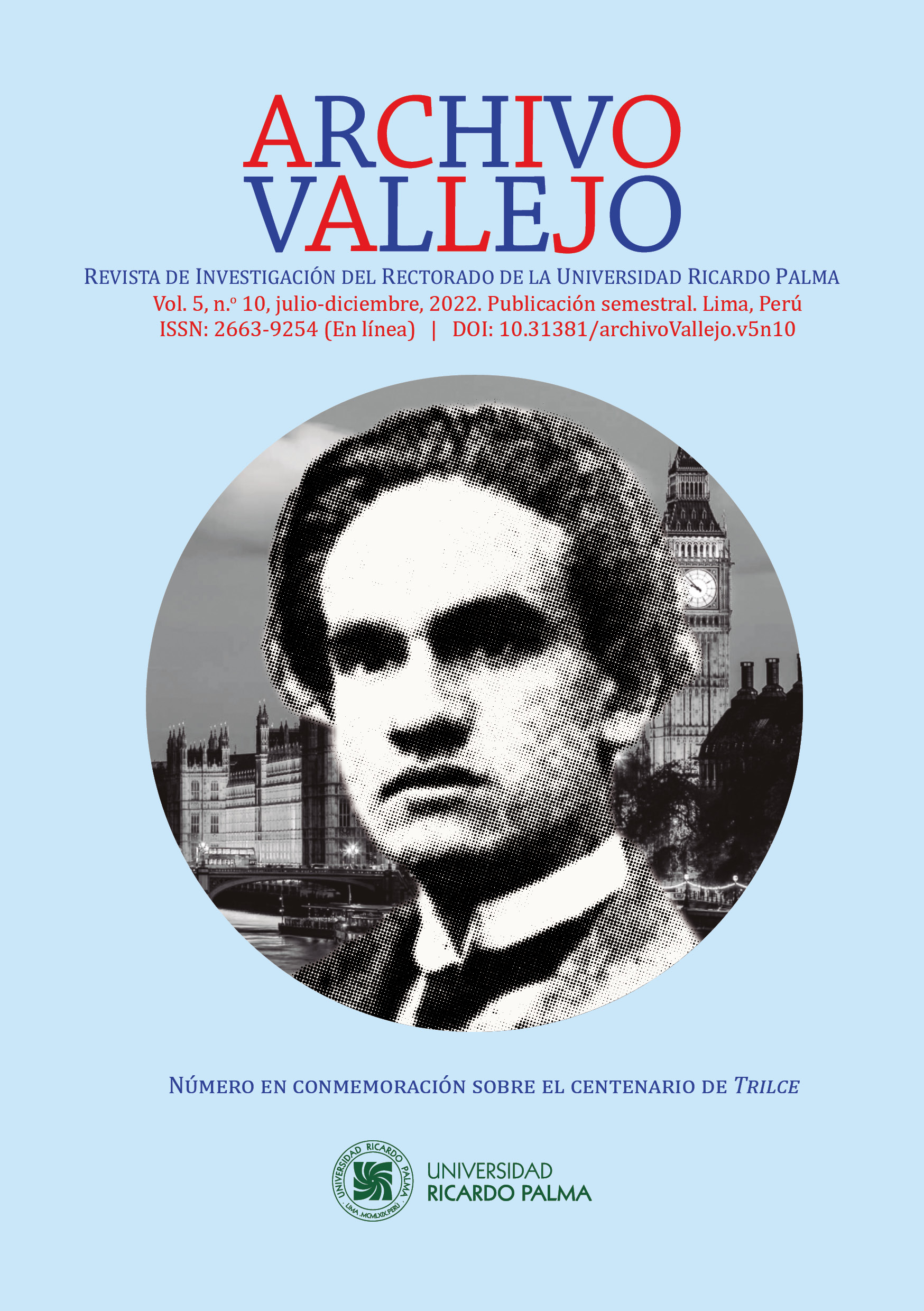César Vallejo solidario: metonimia, transubstanciación secular y utopía socialista
DOI:
https://doi.org/10.31381/archivoVallejo.v5n10.5326Keywords:
ethics, socialism, poetic socialism, metonymy, metaphorAbstract
This article explores two grammatical characteristics, metonymy and metaphor, in relation to two central themes: the melancholy of death and solidarity between men, as they appear and work together in César Vallejo’s poetry. I propose that in Vallejo’s poetics there is a cooperation between metaphor and metonymy, in the sense that the metonymic connection between linguistic elements works in the poetry as a system that metaphorises the world as a totality of connections in flux. This article suggests that these systems of interconnection and interdependence —both linguistic and physical— are very similar to the scientificophilosophical (that is, Epicurean) system of Lucretius’s De Rerum Natura. This comparison, I conclude, is important for a renewed comprehension of the political and secular worldview of solidarity as it appears in Vallejo’s work.
References
American Museum of Nature History (n. d.). Sweat of the Sun. https://www.amnh.org/exhibitions/gold/golden-ages/sweat-of-the-sun
Buelow, C. von (1989). Vallejo’s Venus de Milo and the Ruins of Language. PMLA, 104(1), 41-68. https://doi.org/10.2307/462330
Clayton, M. (2011). Poetry and Pieces: César Vallejo and Lyric Modernity. University of California Press.
Close, L. (1987). Vallejo, Heidegger and Language. In D. G. Coleman and G. Jondorf (eds.), Words of Power: Essays in Honour of Alison Fairlie (pp. 163-186). Glasgow University Printing Department.
Fernández, C. (2021). El camino a Trilce [Doctoral thesis, University College London]. https://discovery.ucl.ac.uk/id/eprint/10134889/1/
Fernandez_Thesis.pdf Fernández, C. & Gianuzzi, V. (2020, 26 November). El doctorado de César Vallejo. Vallejo & Co. https://www.vallejoandcompany.com/el-doctora do-de-cesar-vallejo/
Franco, J. (1976). César Vallejo: The Dialectics of Poetry and Silence. Cambridge University Press.
Gianuzzi, J. V. (2014). César Vallejo’s journalism in context: a quest for autonomy [Doctoral thesis, University College London]. https://discovery.ucl.ac.uk/id/eprint/1425690
Guzmán, J. (2000). Tahuashando: lectura mestiza de César Vallejo. Lom Ediciones.
Hart, S. M. (2007). Stumbling Between 46 Stars: Essays on César Vallejo. Centre of César Vallejo Studies.
Hart, S. M. (2013). César Vallejo: A Literary Biography. Tamesis.
Lucretius (1924). On the Nature of Things. Translated by W. H. D. Rouse; revised by M. F. Smith. Loeb Classical Library. https://www.loebclassics.com/view/lucretius-de_rerum_natura/1924/pb_LCL181.3.xml?readMode=recto
Martin, W. (2012). «Metaphor» and «Metonymy» entries. In R. Greene and S. Cushman (eds.), The Princeton Encyclopedia of Poetry & Poetics. Princeton University Press.
Moran, D. (2022, 14 October). Trilce XLVIII: More on Vallejo and Bergson. Vallejo Siempre [Conference]. V Congreso Internacional Vallejo Siempre, Christ Church, University of Oxford, Oxford.
Nancy, J.-L. (2006). Around the Notion of Literary Communism. In Multiple Arts: The Muses II (pp. 22-34). Stanford University Press.
Ricoeur, P. (2003). The Rule of Metaphor. The Creation of meaning in language (R. Czerny, K. McLaughlin and J. Costello, trans.). Routledge.
Rowe, W. (2013). The Political in Trilce. In S. M. Hart (ed.), Poetry, Poetics, Affect: Revisioning César Vallejo (pp. 3-19). Cambridge Scholars Publishing.
Vallejo, C. (2009). César Vallejo, The Complete Poetry: A Bilingual Edition. Edited and translated by Clayton Eshleman. University of California Press.
World Monuments Fund (2019, February). Piedras Negras. https://www.wmf.org/project/piedras-negras
Published
How to Cite
Issue
Section
License
Copyright (c) 2022 Owen Fortunato Brakspear

This work is licensed under a Creative Commons Attribution 4.0 International License.
Los contenidos publicados en la revista están bajo una licencia CC-BY 4.0, la cual permite:
- Compartir, copiar y redistribuir el material en cualquier medio o formato.
- Adaptar, remezclar, transformar y construir a partir del material para cualquier propósito, incluso comercialmente.
Bajo los siguientes términos:
- Atribución. Usted debe dar crédito de manera adecuada, brindar un enlace a la licencia, e indicar si se han realizado cambios. Puede hacerlo en cualquier forma razonable, pero no de forma tal que sugiera que usted o su uso tienen el apoyo de la licenciante.















